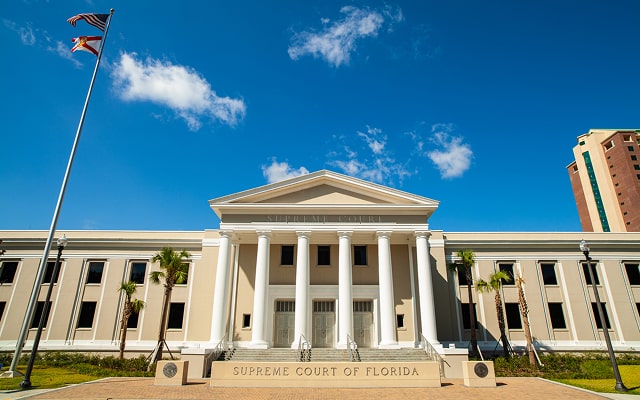What are Florida Court Records?
- Arrest Records
- Judgments
- Bankruptcies
- DUIs & DWIs
- Felonies
- Warrants
- Jail Records
- Lien Records
- Sex Offenses
- Misdemeanors
- Criminal Records
- Federal Dockets
StateCourts.org is not a consumer reporting agency as defined by the Fair Credit Reporting Act (FCRA), and does not assemble or evaluate information for the purpose of supplying consumer reports.
You understand that by clicking "I Agree" you consent to our Terms of Service and Privacy Policy and agree not to use information provided by StateCourts.org for any purpose under the FCRA, including to make determinations regarding an individual's eligibility for personal credit, insurance, employment, or for tenant screening.
This website contains information collected from public and private resources. StateCourts.org cannot confirm that information provided below is accurate or complete. Please use information provided by StateCourts.org responsibly.
You understand that by clicking "I Agree", StateCourts.org will conduct only a preliminary people search of the information you provide and that a search of any records will only be conducted and made available after you register for an account or purchase a report.

With over 23.3 million residents, Florida is the third most populated of the US states. The state's court system comprises appellate and trial courts, and has a judicial branch divided into four separate levels. The levels are divided into the supreme court, district court of appeals, circuit courts, and county courts. Florida allows people to be punished via a death penalty. It's important to note that more than two million cases go through Florida courts annually.
There's a record that is kept for evidence of each hearing or trial. Among the different records kept in Florida, there are criminal indictments, civil suits, complaints, and each of these specific types:
Docket Sheets
Dockets are lists and summaries detailing the various documents from the trial itself, serving as the inventory record.
Judgment and Orders
These are official determinations by a jury or judge. Once the final judgment is determined, the selected judge fills out all the paperwork outlining all the terms, the punishments, and any responsibilities.
Transcripts
A transcript is a complete record that captures everything said throughout court proceedings. The name of every speaker, as well as what is said, is kept in transcripts, and these documents can be used for evidence for appeals or motions.
Evidence
This includes both documents and physical materials gathered from all police reports, as well as introduced by any of the parties during legal proceedings.
Court Minutes
They are official records of courtroom proceedings from the beginning to the completion of the trial. The minutes are composed of a summary detailing the testimonies, events, all official statements, and recesses.
Pleadings
These are records of statements made by each party in a case describing the party's request for the court.
Types of Court Cases
Florida has criminal and civil court cases. Both types are meant to determine who is at fault. The different case types utilize different processes and have different punishments.
Civil Cases
Civil cases are legal processes meant to handle any non-criminal issues between groups or individuals. These disputes may encompass a variety of issues, including contract disagreements, property disputes, and claims related to personal injuries. Notably, civil cases do not involve the participation of state prosecutors. The primary objective of such cases is to provide fair compensation to the victims through the relevant legal framework.
Examples for civil cases are:
- Bankruptcy filings
- Property Disputes
- Family law
A standard of proof that's known as the preponderance of evidence is utilized to resolve most civil cases. This requires a party to demonstrate that their version of the facts is more likely true than not.
Criminal Cases
A criminal case is a legal proceeding initiated by a government representative against an individual accused of committing a crime. These cases aim to maintain the law to ensure justice is administered, rather than resolving disputes between private parties. Consequently, the consequences of criminal cases can be significantly more severe, potentially resulting in imprisonment or, in certain jurisdictions, the death penalty.
Before a jury reaches a verdict, the prosecuting authority must establish that the defendant is guilty of the alleged crime beyond any reasonable doubts. This process is concluded when the jury decides unanimously and can confirm the individual's culpability in the matter.
Examples of criminal cases seen commonly are:
- Domestic violence
- Burglary
- Murder
What Are the Different Courts in Florida?
Florida divides the various courts through the state by tiers. The higher tiers maintain jurisdiction over the lower ones.
State Supreme Court
The Florida Supreme Court maintains the highest level of authority in the state. It has the power to review final decisions, including death sentences, district court rulings that invalidate a state law or constitutional provision, bond validations, and specific orders from the Public Service Commission about utility rates and services.
The court can also issue special orders like prohibition, mandamus, quo warranto, and habeas corpus. Additionally, the Supreme Court gives advisory opinions to the Governor when asked. The court has seven Justices. To make a decision, at least five Justices must be involved, and at least four must agree. The court's main office is in the Supreme Court Building in Tallahassee.
Florida Circuit Courts
Circuit courts handle most trial cases that are not assigned to county courts and also review some appeals from county court cases. These courts can take on civil disputes where the amount involved is over $50,000. They deal with issues related to the estates of deceased individuals, minors, and people who are declared incapacitated.
Circuit courts also handle juvenile cases, criminal cases for all felonies, tax disputes, and cases that determine property titles and boundaries. Additionally, circuit courts can issue special orders, such as writs of certiorari, prohibition, mandamus, quo warranto, and habeas corpus. They can also issue any other orders necessary to perform their duties fully.
District Courts of Appeals
The District Courts of Appeals typically hear appeals from final judgments of trial courts. They can also issue special orders, such as certiorari, prohibition, mandamus, quo warranto, habeas corpus, and other necessary writs to exercise their authority fully. Additionally, these courts can review final decisions determined by state agencies when they perform their duties in the executive branch.
Florida County Courts
Florida County Courts handle civil disputes involving $50,000 or less. Much of their caseload includes traffic violations, ranging from minor infractions to more serious offenses. Additionally, they deal with misdemeanor cases, which are less severe than felonies but can still carry fines, community service, or short-term incarceration.
Furthermore, the courts address small claims disputes, allowing individuals to resolve relatively minor financial disagreements without requiring extensive legal representation. By managing these varied cases, Florida County Courts help facilitate a more efficient and accessible legal process for all community members.
Speciality Courts
Also known as problem-solving courts, these sessions are affiliated with the circuit courts and provide alternative sentencing options for qualifying non-violent offenders. The court mandates that defendants participate in treatment and monitoring, which includes therapy, rehabilitative programs, and regular drug testing. In Florida, specialty courts encompass various areas, including drug-related offenses, mental health issues, veterans' affairs, and early childhood concerns.
How Many Federal Courts Are in Florida?

Florida has three federal district courts: the U.S. District Court for the Middle District of Florida, the U.S. District Court for the Northern District of Florida, and the U.S. District Court for the Southern District of Florida. Presently, there are 33 sitting federal district judges in the state, most of whom are affiliated with the Republican Party.
These courts have limited jurisdiction over cases that challenge federal laws or involve disputes between parties from different states. In addition, these courts have the authority to hear bankruptcy cases. Decisions rendered by federal district courts can be appealed to the U.S. Court of Appeals for the 11th Circuit.
How Many Court Cases Are Filed Each Year in Florida?
Florida trial courts handle a substantial volume of cases every year:
- Family: Family courts hear over 100,000 cases, with a third of these cases involving marriage dissolution.
- Probate: At least 70,000 probate matters are filed annually.
- Traffic: Over 1.6 million traffic cases are finalized in Florida annually. These include traffic-related civil infractions and criminal offences.
- Civil Cases: Over 1 million civil cases become filed in Florida annually, and the majority of these cases are heard in county courts.
- Criminal Cases: Over 300,000 criminal cases are heard in Florida annually.
How Do I Look Up Court Cases in Florida?

In Florida, court records are managed by the court that handled the case. To access court records, you may be required to contact the trial court that handled the case. There is no central database for trial court records in Florida, so those seeking trial court records may visit the court location in person or search the official websites. Note that fees may be incurred to obtain a copy of official court records and transcripts.
Unlike trial court records, appellate court records are entered into the Florida Appellate Court Case Information System. The system allows users to search dockets and case documents in Florida's appellate courts. Users do not need to register to search public records on the system.
What Court Records Are Not Available to the Public in Florida?
In Florida, certain court records are confidential and not open to the public. This can happen if disclosing the records would threaten fair court proceedings, expose trade secrets, harm essential government interests, help gather evidence in legal cases, or hurt innocent third parties.
Records currently labeled as confidential by court rules, such as those related to the Rules for Admission to the Bar, Florida Statutes, previous court decisions in Florida, and the Judicial Qualifications Commission, are also not accessible to the public.
In addition, memoranda, drafts of opinions and orders, court conference notes, and other similar documents created by judges or court staff as part of their decision-making process are not available for public viewing.
Lastly, copies of arrest and search warrants and the supporting affidavits kept by judges, clerks, or court staff remain confidential until the warrants are executed or law enforcement decides they can be released.
Florida Counties
- Alachua
- Baker
- Bay
- Bradford
- Brevard
- Broward
- Calhoun
- Charlotte
- Citrus
- Clay
- Collier
- Columbia
- De Soto
- Dixie
- Duval
- Escambia
- Flagler
- Franklin
- Gadsden
- Gilchrist
- Glades
- Gulf
- Hamilton
- Hardee
- Hendry
- Hernando
- Highlands
- Hillsborough
- Holmes
- Indian River
- Jackson
- Jefferson
- Lafayette
- Lake
- Lee
- Leon
- Levy
- Liberty
- Madison
- Manatee
- Marion
- Martin
- Miami Dade
- Monroe
- Nassau
- Okaloosa
- Okeechobee
- Orange
- Osceola
- Palm Beach
- Pasco
- Pinellas
- Polk
- Putnam
- Saint Johns
- Saint Lucie
- Santa Rosa
- Sarasota
- Seminole
- Sumter
- Suwannee
- Taylor
- Union
- Volusia
- Wakulla
- Walton
- Washington
